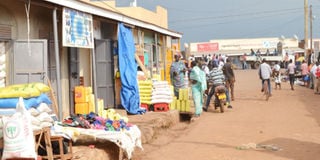Bweyale: A home to more than 50 tribes

Bweyale is a busy business area. PHOTO BY DAN WANDERA
What you need to know:
Bweyale is home to many refugees and internally displaced people who live in harmony with the local residents.
While many parts of the country have by-laws limiting night movements to particular fixed time in the night, for Bweyale, whose population is mostly internally displaced persons and refugees, night movements are permitted basing on the historical factors of the area.
A destination for many business persons, including those seeking admission to the refugee camp, Bweyale is about 220kms north of Kampala City on Kampala-Gulu highway in Kiryandongo District.
It is a fast growing area with an open opportunity to become a business hub linking the central and western parts of Uganda to markets in the northern parts of the country.
A town known to house more than 50 ethnic groups, Bweyale is home to more than 98,000 people. While Local Council III Chairperson Edward Byakagaba describes his town as the most highly populated town council in the country where the refugee population outnumbers that of the indigenous residents, the fact that the town is fast expanding in areas of business and infrastructure makes it unique.
“I believe that Bweyale is likely to be the only town council with a population nearing 100,000 with over 50 different ethnic groups all working together since many are less concerned about their respective troubled journey that saw them settle in Bweyale as refugees and displaced persons. The first set of displaced persons from Northern Uganda settled in this area in 1989,” Byakagaba says.
Population composition
By 1988, the area had less than 80 homesteads with much of the land idle and bushy, including the government 6 square mile ranch now home to the 56,000 refugees from South Sudan, Rwanda, Kenya, Burundi and the Democratic Republic of Congo. The other population includes the displaced persons from Bududa and many displaced persons who failed to relocate to their respective areas in northern Uganda after the insurgency. The indigenous population, according to the 2014 Uganda National Housing and Population Census were estimated at 37,000.
Interestingly both the refugees and indigenous residents enjoy equal rights in managing and owning businesses, ranging from retail, wholesale, lodging facilities, bars, restaurants, among other businesses.
A home to many International humanitarian organisations working in partnership with the Office of the Prime Minister and the United Nations High Commission for Refugees,
Bweyale perhaps stands out high among the few towns where people move through the night with several of the business premises including bars, lodges, shops, night clubs open 24 hours.
“Unlike other towns where we expect business premises to be closed after 11pm, the case of Bweyale is different. Some of the refugees and displaced persons have no permanent homes and keep moving through the night. You cannot stop them because you have no free facility to accommodate such people. Some are reporting to the Kiryandongo Refugee camp and cannot be stopped. This perhaps explains why we have less trouble with some of these people, Byakagaba explains.
The fear
For fear of being tracked and possibly face the wrath of their perceived former tormentors back home across the international borders, several of the refugees now operating businesses could not reveal their true identity and refused to have their pictures taken.
“I have a relative in Australia who was once a refugee at this very camp but got chance to fly to Australia. I take care of the family and she has facilitated us to start up a business. We have also constructed a house. We have forgotten about our original motherland in Burundi. We are now Ugandans,” A refugee who identifies herself as Rosette, shares in an interview.
Rosette is among the several other lucky refugees who have had the opportunity to start life outside the main refugee camp and are part of the Bweyale business community.
Semei Karangwa, a resident of Nyamusasa Cell in Bweyale Town Council, is among the indigenous residents who have seen the area rise from four buildings to a town with streets .
Land and roads
“I cannot imagine the price of a 50ft-100ft plot going for Shs25m on the outskirts of this town. These plots used to go for Shs2m. When the first batch of the displaced persons from northern Uganda first settled in this area in 1989, we had no good roads and many of these areas were very bushy.
“I believe this town is unique from other towns simply because of the diverse ethnic groups, presence of international organisations serving the refugees and displaced persons. We have good schools, roads and health centres partly funded by the organisations taking care of the refugees,” Karangwa shares.
Residents claim the rush for plots to construct commercial buildings has seen the price of land double. While you could get a 50ft X 100ft plot at Shs10m in the central business area in 2014, the prices now range between Shs25m and Shs35m.
Rent
A single room goes for Shs60, 000 per month. A double room is Shs85,000. For the business buildings in the business centre, especially the along Kampala-Gulu highway, the charges differ depending on the nature and location of the buildings. However, on average, a single business room is at Shs200,000 per month.
Health
Bweyale Town has three health centres. Most referrals go to Kiryandongo hospital located about 4kms from Bweyale Town centre.
Security
Although it is a highly populated area that receives new residents every day, it has not registered a big challenge in terms of security,” says Charles Byakagaba, the LC III Chairperson.
He adds that: “The police is backed up with other security agencies, including the UPDF since the town hosts refugees from different countries. Apart from fights in bars, the general security is calm. Each of the residents respects the rights of others. This is partly because of the regular sensitisation from the local government, NGOs and the police.”




